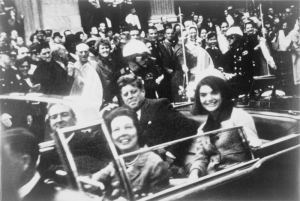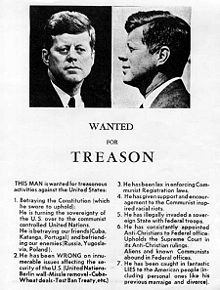JFK/Assassination
| Introduction only. Lots more to be imported from Wikipedia following major edits and additions |

The circumstances surrounding the assassination of US President John F Kennedy on 22 November 1963 spawned immediate suspicions of a conspiracy. The following year an official investigation by the Warren Commission concluded that there was no conspiracy and that Lee Harvey Oswald acted alone in firing the shots that killed the president. Today [October 2013] most Americans believe that Oswald did not act alone.[1]. Diligent work by a small army of concerned researchers has uncovered mountains of evidence indicating that the Commission was set up to fail and that the US government itself has, ever since, been involved in a determined, ongoing cover up of what really happened.
As wikispooks user Charles Drago so bluntly and accurately opines "Anyone, with reasonable access to the evidence who does not conclude that JFK was killed by conspirators, is cognitively impaired and/or complicit in the crime".
Subsequent official investigations have confirmed most of the conclusions of the Warren Commission which remains the Official Narrative of the event. However, the United States House Select Committee on Assassinations (HSCA) concluded that Kennedy was probably assassinated as the result of a conspiracy, with "...a high probability that two gunmen fired at the President."[2] - but no person or organization was identified by the HSCA as being a co-conspirator.
James Douglass, author of JFK and The Unspeakable, notes that an earlier plan was to assassinate Kennedy in Chicago, but that it never came into effect since the president cancelled that trip.
Background
President John F Kennedy was assassinated by gunfire as he traveled in a motorcade in an open-top limousine in Dallas, Texas on Friday, November 22, 1963 (12:30 pm, CST); Texas Governor John Connally was wounded during the shooting, but survived. Within two hours, Lee Harvey Oswald was arrested for the murder of Dallas policeman JD Tippit and arraigned that evening. Shortly after 1:30 am, Saturday, Oswald was arraigned for murdering President Kennedy as well.[3][4] On Sunday, November 24, at 11:21 am, nightclub owner Jack Ruby shot and killed Oswald as he was being transferred to the county jail.
Immediately after the shooting, many people suspected that the assassination was part of a larger plot.[5] Ruby's shooting of Oswald compounded initial suspicions.[5] Among conspiracy theorists, Mark Lane has been described as writing "the first literary shot" with his article, "Defense Brief for Oswald," in the December 19, 1963 edition of the National Guardian.[6] [7] Thomas Buchanan's Who Killed Kennedy?, published in May 1964, has been credited as the first book alleging a conspiracy.[8]
In 1964, the Warren Commission concluded that Oswald acted alone and that no credible evidence supported the contention that he was involved in a conspiracy to assassinate the president.[9] The Commission also indicated that Dean Rusk, the Secretary of State; Robert McNamara, the Secretary of Defense; C. Douglas Dillon, the Secretary of the Treasury; Robert F Kennedy, the Attorney General; J Edgar Hoover, the Director of the FBI; John A. McCone, the Director of the CIA; and James J. Rowley, the Chief of the Secret Service, each independently reached the same conclusion on the basis of information available to them. [9]
In 1979, the United States House Select Committee on Assassinations (HSCA) agreed with the Warren Commission that Oswald assassinated Kennedy, but concluded that the Commission's report and the original FBI investigation were seriously flawed. The HSCA concluded that at least four shots were fired with a "high probability" that two gunmen fired at the President, and that a conspiracy was probable.[2] The HSCA stated that "the Warren Commission failed to investigate adequately the possibility of a conspiracy to assassinate the President."[2]
The Ramsey Clark Panel and the Rockefeller Commission both supported the Warren Commission's conclusions, while New Orleans District Attorney Jim Garrison unsuccessfully prosecuted Clay Shaw for conspiring to assassinate Kennedy.
References
- ↑ Poll: Most Believe 'Cover-Up' of JFK Assassination Facts
- ↑ a b c Report of the Select Committee on Assassinations of the U.S. House of Representatives - 1979 Summary of Findings and Recommendations
- ↑ Warren Commission Report, Chapter 5: Detention and Death of Oswald, Chronology. p. 198.
- ↑ Tippit murder affidavit: text, cover. Kennedy murder affidavit: text, cover.
- ↑ a b The Kennedy Assassination - by Peter Knight. Edinburgh University Press Ltd 2007 ISBN 978-1-934110-32-4 page=75
- ↑ Reclaiming History: The Assassination of President John F. Kennedy - Vincent Bugliosi. 2007. WW Norton & Company ISBN 0-393-04525-0 page=989
- ↑ Oswald Innocent? A Lawyer’s Brief
- ↑ Donovan Barna William Conspiracy Films: A Tour of Dark Places in the American Conscious 2011 McFarland & Company, Jefferson, North Carolina ISBN 978-0-7864-3901-0 page=34
- ↑ a b Report of the President's Commission on the Assassination of President John F. Kennedy 1964 Chapter 6
See Also
Wikipedia is not affiliated with Wikispooks. Original page source here
